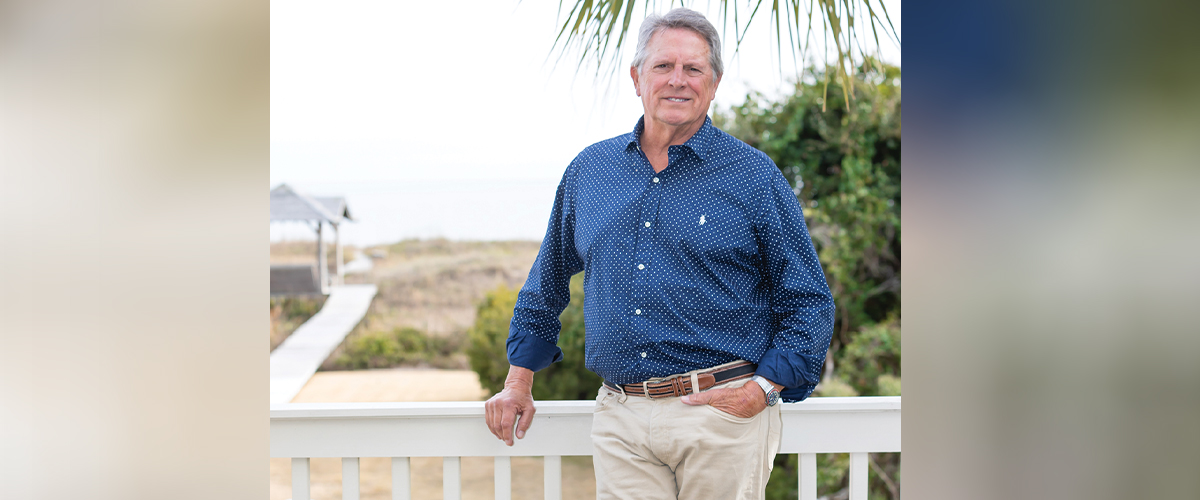WRITTEN BY Stephanie Hunt
PHOTOGRAPH BY Aleece Sophia

Randy Walker, president of the Isle of Palms-based Dunes Properties, was one of numerous Charleston-area residential real estate brokers who saw record sales during the pandemic.
Meanwhile, as hotels sat empty for much of last year, the private home market went gangbusters. Charleston’s residential real estate sector was one big economic bright spot in the shadow of COVID-19. “We didn’t see this uptick coming at all. In fact, we were anxious this time last year, and in March, we cut our business expenses,” says Randy Walker, president of Dunes Properties, a real estate brokerage firm that also manages coastal vacation rentals. “It was scary for us, especially when they closed the beaches. We lost $750,000 in vacation rental revenue.” And then a huge influx of people from locked-down metropolitan areas in the Northeast and Midwest started flocking to Charleston. “We were completely shocked. We had no idea that an exodus from the cities was coming,” Walker says.
Dunes Properties closed more than $415 million in residential sales in 2020, setting a 31-year company record, and exceeding 2017’s previous record of $320 million by 30 percent. They were far from alone in exceeding their sales expectations. Across Greater Charleston, residential real estate closings were up by 31 percent, with median home sales prices up by 14.4 percent. The biggest concern now is lack of inventory, all thanks to pandemic-related shifts in virtual schooling for families with children and new norms of remote working for adults.
“We’ve been discovered,” says Walker. “People fleeing big cities and small apartments realized Charleston checked all the boxes: good climate, great culture, and affordable cost. If you can live and work anywhere, where better to be than near the ocean, in a climate comfortable enough to be outside as much as possible.”
Given the lack of housing inventory, Walker does not anticipate 2021 sales to match last year’s record. Home and property prices will likely go up, and sales will even out, but the vacation rental market should be robust as people begin to travel again, especially in the regional drive market. “We’re going back to great; probably not as extraordinary a market as 2020, but great,” Walker believes. And after all the other upheavals of the last year, great is more than good enough.
“If you can live and work anywhere, where better to be than near the ocean, in a climate comfortable enough to be outside as much as possible.” —Randy Walker, Dunes Properties
Whether or not the commercial real estate business rebounds in similar fashion remains to be seen, according to Frank Norvell, founder and broker in charge of Norvell Real Estate Group, which specializes in the commercial sector. Norvell sat on the mayor’s ad-hoc task force to address King Street real estate concerns as a result of COVID, whereby occupancy rates hovered around 82 percent in November 2020, and rose slightly by January 2021. “The demand for hospitality and retail space, especially for smaller shops, I have to believe will be fine in the long run,” says Norvell, although the verdict is out on how companies will adjust their office space needs in the post-pandemic world.
Most office leases are three to seven years out, so even if space has been vacated due to remote working during shutdown, those buildings are still currently leased, Norvell explains. “What happens when it’s time to renew or renegotiate is yet to be determined. I do think there will be an adjustment, both in rates and occupancy,” he adds. BenefitFocus has recently listed their entire 145,800 square feet of Class A office space on Daniel Island for lease, as one indicator of the shift Norvell anticipates. On the bright side, many companies may look to relocate to a market like Charleston, so, he suggests—and hopes—“it could mirror the residential real estate boon in the months to come.”
>>Back to The Long Strange Year article